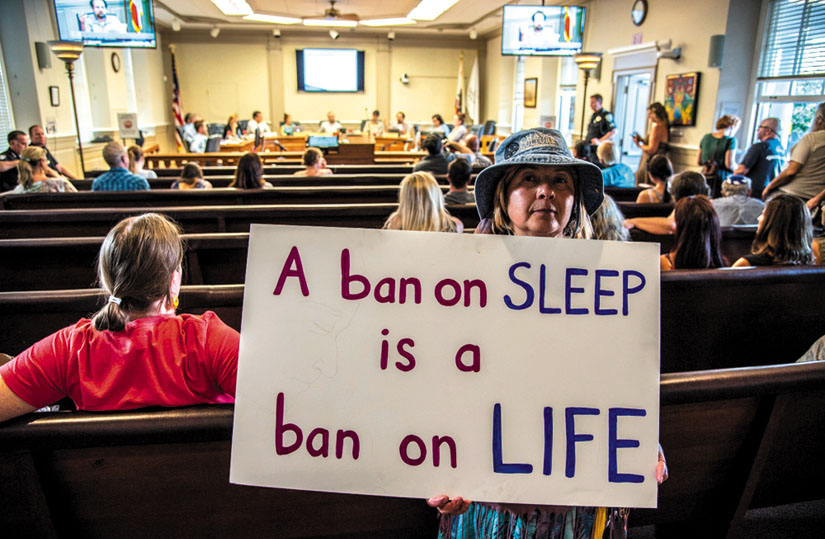by Steve Pleich
In Santa Cruz, advocates for people experiencing homelessness — including the Freedom Sleepers whose continuing actions at the Santa Cruz City Hall have been the subject of several reports in Street Spirit — have been working to directly address the criminalization of homelessness and calling for the repeal of the city’s camping/sleeping ban.
Beginning on July 4, 2015, activists have been consistent in their position that ordinances prohibiting and criminalizing lying, sitting, and sleeping in public are unconstitutional and pose a grave danger of being selectively enforced against an entire class of people.
In August, this position found unexpected support from the Obama administration. A Statement of Interest submitted by the U.S. Department of Justice (DOJ) in the U. S. District Court case of Janet F. Bell, et. al v. City of Boise, et. al reflected a dramatic shift in federal policy away from criminalizing homelessness. The statement articulated a legal framework that went to the heart of homelessness.
Writing for the DOJ, Civil Rights Division Attorney Sharon Brett noted, “When adequate shelter space exists, individuals have a choice about whether or not to sleep in public. However, when adequate shelter space does not exist, there is no meaningful distinction between the status of being homeless and the conduct of sleeping in public. Sleeping is a life-sustaining activity — i.e., it must occur at some time in some place. If a person literally has nowhere else to go, then enforcement of the anti-camping ordinance against that person criminalizes her for being homeless.”
The Statement from the Department of Justice concluded: “Thus, criminalizing homelessness is both unconstitutional and misguided public policy, leading to worse outcomes for people who are homeless and for their communities. If the Court finds that it is impossible for homeless individuals to secure shelter space on some nights because no beds are available, no shelter meets their disability needs or they have exceeded the maximum stay limitations, then the Court should also find that enforcement of the ordinances under those circumstances criminalizes the status of being homeless and violates the Eighth Amendment to the Constitution.”
Regrettably, the Boise case was dismissed on standing grounds but it continues to have a profound impact on the criminalization of homelessness and particularly on the enforcement of camping bans by local municipalities.
Speaking at a December forum on homeless rights hosted by the Freedom Sleepers in Santa Cruz, Tristia Bauman, Staff Attorney for the National Law Center on Homelessness and Poverty (NLCHP), said, “Criminalization of people experiencing homelessness has risen more than 60 percent nationwide and that trend is almost certain to continue. The Bell statement may be the opportunity to move challenges to camping bans from city hall to local courthouses.”
Activists in Santa Cruz are vigorously lobbying the NLCHP to commence a Bell v. Boise-based lawsuit in Santa Cruz and the American Civil Liberties Union of Santa Cruz County has formally requested legal assistance from the Northern California affiliate.
Said ACLU Chapter Chair Peter Gelblum, “In our view, the situation in Santa Cruz is legally indistinguishable from the situation in Boise.”

But the DOJ’s statement in the Bell case has had one other welcome yet unexpected impact in Santa Cruz. The police and park rangers seem increasingly reluctant to issue citations for violation of our local camping/sleeping ban.
A survey of pre-Bell citations indicated that a very large percentage of the tickets issued were for violations of Santa Cruz Municipal Code Section 6.36.010, the camping/sleeping ban. Yet a second survey of 1457 citations issued between September 15 and November 3, 2015, showed that just 75 of those citations were for violation of 6.36.010.
Indeed, word on the street from our homeless allies seems to confirm this situation. Says a longtime homeless community member, “The SCPD and Park Rangers don’t want to give us tickets for sleeping. This is a big change from just a few months ago.”
Clearly, the powers that be in Santa Cruz are trying to proactively head off any prospective Bell v. Boise style litigation challenging the camping/sleeping ban. But does this seeming abundance of caution come too late?
The dismissal of Bell in federal court was based upon the factual finding that none of the plaintiffs had been issued tickets for violation of the challenged ordinance. This is not the case in Santa Cruz.
Although the issuance of camping ban tickets has slowed, there is no shortage of homeless community members who are still receiving tickets and whose cases are still working their way through our local court system.
In Santa Cruz, there is little doubt that people experiencing homelessness are being criminalized on the basis of status alone, in violation of their Eighth Amendment right to be free from cruel and unusual punishment.
Our entire community, unhoused and housed alike, is living in the Shadow of Bell v. Boise. The hope is that we can all emerge into the sunlight equally free.
Steve Pleich is a member of the Freedom Sleepers and an advocate for homeless rights in Santa Cruz and Santa Cruz County.
